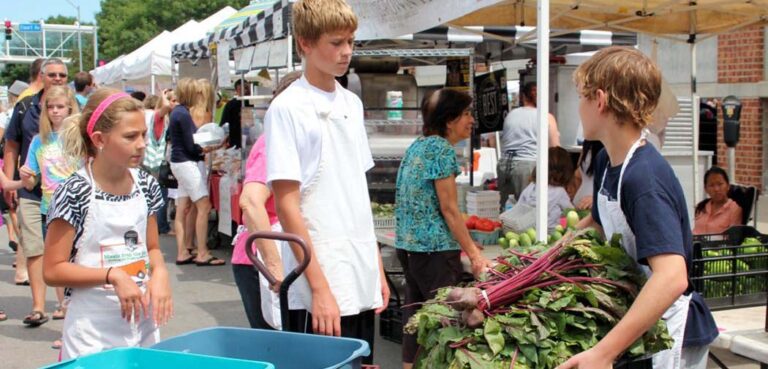5 Tips for Starting a Farmers Market in Your Community
Events support local agriculture and bring people together

Across the nation, eating local foods has grown in popularity, and as demand for fresh food sources grows, farmers markets are springing up in communities large and small. If your community hasn’t yet joined the trend, the time is ripe to explore starting a farmers market for next year’s growing season. Looking for tips?
Howell Tumlin, CEO of the Southland Farmers Market Association, which operates 13 farmers markets in southern California, says he gets calls daily from people seeking advice on starting a farmers market. Here are five proven guidelines gleaned from his experience and that of other experts on the matter to help kick-start the planning process:
In This Article
1. Start with a vision for your farmers market.
Tumlin says the key variable for success is determining the purpose of the farmers market. For instance, cities may think a farmers market will help revitalize a depressed downtown by bringing in foot traffic, others want to provide access to fresh produce for an underserved neighborhood, while some are created to generate revenues for other programs.
2. Customize your farmers market to best suit your community.
Kelly Foss, director of the Downtown Farmers Market in Des Moines, Iowa, which over 39 years has mushroomed into 200 vendors and 25,000 visitors every summer weekend, says there is no ideal farmers market that every community should strive to replicate.
“Each city is unique, so the market should be personalized around their community,” Foss says. “The best are custom made. I encourage people to visit other markets to get ideas and then model their market by drawing from those findings.”
3. Create a social experience for visitors to your farmers market.
Farmers markets have become a vital component in “civic agriculture,” a term that describes an emerging local food system based on connecting people with small growers at a unique community gathering where the social experience is a major part of the attraction.
“A farmers market has to be so much more than going to buy or the food,” Foss says. “People crave the whole experience. We attempt to strike a balance of quality and quantity of products so it’s not just another event – not a carnival, not a flea market – and we stick with that.”
4. Select your farmers market site carefully.
According to the University of Florida IFAS Extension, choosing the right location for a farmers market can be tricky. Many factors come into play, including proximity to customers, parking availability, space to accommodate vendors and their trucks, cover for extreme weather and comfortable seating, so customers can socialize, enjoy music or entertainment. The University of Missouri Extension says that site selection also impacts insurance costs and food safety issues.
5. Consider lining up a sponsor.
Sponsors can help with everything from providing a site to direct financial backing and publicity, allowing you to focus solely on the regular operations and social aspects of coordinating a farmers market. To come up with prospective sponsors, remember that associating with a farmers market can be mutually beneficial to companies or civic organizations whose mission and values align with the goals of your market.
For example, five of the 13 farmers markets in the Southland Farmers Market Association are sponsored by health-care provider Kaiser Permanente and held on their medical center campuses.
“They were ahead of their time, starting their first one seven years ago,” Tumlin says. “Kaiser Permanente has faithfully kept this corporate commitment wherever it is feasible, including their campuses in the San Francisco Bay area and Hawaii.”
